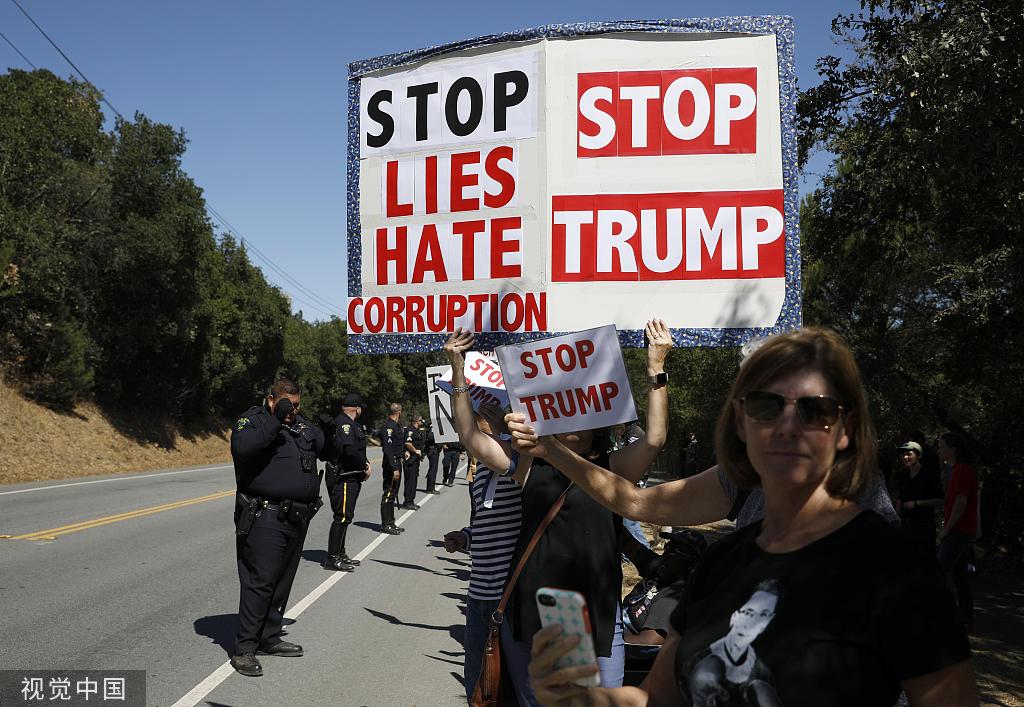California to Trump: 'See you in court'
By Ai Heping in New York | China Daily | Updated: 2019-09-23 09:27

When Barack Obama was in the White House, the state of Texas sued his administration at least 48 times. For Donald Trump, no other state in the United States has resisted his administration in and out of court as frequently as California.
On Friday, it was "Mr President, we'll see you in court" from Attorney General Xavier Becerra as the state filed its 60th suit against Trump, more suits against a sitting US president than any in history.
California and 23 other US states, along with the cities of Washington, Los Angeles and New York, sued the Trump administration after it moved to revoke California's authority to set its own vehicle emissions standards, first granted under Obama.
Trump announced on Twitter the plan to revoke California's greenhouse gas pollution waiver on Sept 18 while in Los Angeles to attend a fundraiser. The next day the Environmental Protection Agency formally announced it.
Taking the Trump administration to court over the move further escalates what has been an antagonistic relationship between Trump and the state on many policy matters, including immigration, the environment and healthcare.
Those lawsuits have resulted in 37 legal victories for the state - a mix of decisions in favor of California, or preliminary injunctions halting the Trump administration's actions pending a final decision.
The state that launched the political career of Ronald Reagan and was once a hotbed of conservatism has become a very liberal, very Democratic state.
One in eight US citizens lives in California. Its 39.5 million people make it the country's most ethnically diverse state. Whites make up just under 38 percent of the population. Latinos are the largest group at 39 percent, followed by Asian-Americans - the fastest growing group - at 15 percent and African-Americans at 6 percent, according to the Public Policy Institute of California.
Democrats hold the governorship and every other statewide office and have a super majority in both houses of the legislature. Independents hold more elected political positions in the state than Republicans.
The party gained even more power in the House of Representatives in last year's midterm elections. Republicans hold just seven of the state's 53-member House delegation. And the speaker of the House is Nancy Pelosi, a California Democrat who often tangles with Trump.
"Donald Trump has put California in his sights because we have a governor and statewide officials, all of whom are Democrats," said Sherry Bebitch Jeffe, a political analyst and former University of Southern California professor. "We have a legislature under the control of Democrats, who are all of them about 180 degrees opposite in terms of the major issues that concern Californians - opposite from Donald Trump. We are perceived as the fulcrum of the 'resistance' movement."
During his time in office, Trump has singled out the state on Twitter more than any other, calling its sanctuary cities "ridiculous", accusing it of "gross mismanagement" of its forests, and allowing the streets of San Francisco to become "disgusting" with its homeless population.
Not lone critic
Trump hasn't been his party's lone critic of California.
"They (Democrats) want us to be just like California, right down to tofu and silicone and dyed hair," Texas Republican Senator Ted Cruz told a crowd of supporters during his reelection campaign in 2018.
Some Republicans have said that the party should plan to make California a symbol of Democratic dysfunction and "socialistic stagnation" in the 2020 presidential campaign.
Dan Patrick, the Republican lieutenant governor of Texas, has suggested that Trump's reelection slogan should be: "I'm not going to let the Democrats turn America into California."
Trump has repeatedly hammered away at the state's homeless problem.
During a reelection rally on Aug 2 in Cincinnati, Ohio, he said: "California is a disgrace to our country. It's a shame. The world is looking at it. Look at Los Angeles with the tents and the horrible, horrible disgusting conditions."
That came just days after Governor Gavin Newsom signed a bill requiring presidential candidates to release their tax returns if they want to appear on the state's primary ballot - a law aimed at Trump, who hasn't released his tax returns.
On Thursday, a federal judge ordered a temporary injunction against the law saying California can't force candidates to disclose their tax returns. He said he would make his final ruling on the law before Oct 1.
After Trump said he was revoking the state's emission policy, later that day as he returned to Washington from a three-day trip to California and New Mexico, Trump told reporters on Air Force One that San Francisco was in "total violation" of environmental rules because of used needles used by many homeless people that he said were ending up in the ocean. "We're going to be giving them a notice very soon," he said, indicating that the city could be put on notice by the EPA within a week that its homelessness problem was causing environmental damage.
San Francisco Mayor London Breed called Trump's comments "ridiculous".
The emissions lawsuit represents the start of what is expected to be a legal battle over states' rights and climate change that is likely be resolved only when it reaches the Supreme Court.
The federal government has never before revoked a waiver once it's been granted. But the Trump administration argues that California is violating a long-held principle that only the US government can regulate automobile fuel mileage standards.
The auto industry has long favored a unified emissions rule. Four automakers in July - Ford, BMW, Honda and Volkswagen - announced they had partnered with California to manufacture cars that would satisfy the state's more stringent emissions standards.
























